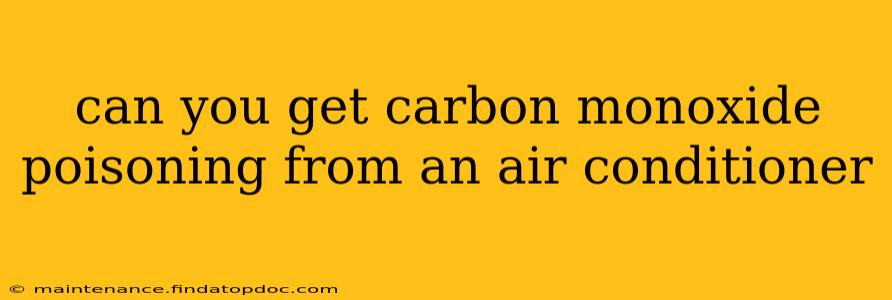Can You Get Carbon Monoxide Poisoning from an Air Conditioner?
The short answer is: yes, but it's rare. While air conditioners themselves don't produce carbon monoxide (CO), they can indirectly contribute to CO poisoning under certain circumstances. Understanding these circumstances is crucial to ensuring your safety. This article will explore the potential risks and provide helpful preventative measures.
How Can an Air Conditioner Contribute to Carbon Monoxide Poisoning?
Air conditioners primarily cool the air by using refrigerants, a process that doesn't involve combustion and therefore doesn't directly produce CO. However, several factors can create a dangerous situation:
-
Faulty or Malfunctioning Appliances: The most common scenario involves a malfunction in another appliance that produces CO, such as a furnace, water heater, or gas stove. If these appliances aren't properly vented, the CO can leak into your home and accumulate. Your air conditioner, especially a central AC system, then circulates this contaminated air throughout your house, increasing exposure and risk. A faulty gas-powered generator used during a power outage can also contribute to CO poisoning, with the AC unit unknowingly spreading the gas.
-
Improper Installation or Maintenance: Incorrect installation of gas-burning appliances can lead to improper ventilation, allowing CO to seep into the home. Similarly, neglecting regular maintenance checks on these appliances increases the risk of malfunction and CO leaks. A poorly maintained furnace or water heater is a silent danger.
-
Blocked Vents: Obstructed vents restrict the flow of exhaust gases from gas-powered appliances. This build-up can then be circulated by the AC, leading to high CO concentrations.
What are the Symptoms of Carbon Monoxide Poisoning?
Recognizing the symptoms of CO poisoning is crucial for early intervention and prevention of serious health consequences. Symptoms can vary depending on the level of exposure, but common signs include:
- Mild Exposure: Headache, dizziness, weakness, nausea, vomiting, and shortness of breath.
- Severe Exposure: Confusion, loss of coordination, chest pain, and loss of consciousness. In extreme cases, it can be fatal.
How Can I Prevent Carbon Monoxide Poisoning Related to My Air Conditioner?
Taking proactive steps significantly minimizes the risk of CO poisoning. Here are key preventative measures:
-
Regular Maintenance: Schedule annual inspections and maintenance for all gas-burning appliances (furnaces, water heaters, etc.). This ensures they are functioning correctly and properly vented.
-
Check for Leaks: Regularly inspect gas lines and appliances for leaks. If you suspect a leak, immediately contact a qualified technician. Never attempt repairs yourself.
-
Proper Ventilation: Ensure adequate ventilation in your home, particularly in areas where gas appliances are located. Never block vents or chimneys.
-
CO Detectors: Install battery-operated CO detectors on every level of your home, especially near bedrooms and gas appliances. Test them regularly to ensure they're functioning correctly. Replace detectors according to the manufacturer's recommendations.
-
Professional AC Installation: Make sure your air conditioner, particularly a central unit, is professionally installed to ensure proper integration with your home's ventilation system.
Can I Get Carbon Monoxide Poisoning Directly From My Air Conditioner's Refrigerant?
No, modern refrigerants used in air conditioners are not toxic. While leaks can cause problems, they don't produce carbon monoxide. The danger lies in the indirect contribution of the AC circulating already present CO from other sources.
Is it Possible to Get Carbon Monoxide Poisoning While the AC is Off?
Yes, absolutely. Carbon monoxide poisoning is unrelated to the operation of the air conditioner. The presence of CO in a home isn't dependent on whether the AC is running. The danger comes from poorly ventilated gas appliances, regardless of whether the air conditioner is on or off.
By understanding the potential indirect link between air conditioners and CO poisoning and taking preventative steps, you can significantly reduce the risk and create a safer home environment. Remember, proactive maintenance and vigilance are key to ensuring the well-being of you and your family.
